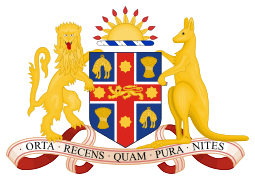New South Wales Court of Criminal Appeal
The New South Wales Court of Criminal Appeal, part of the Supreme Court of New South Wales, is the highest court for criminal matters and has appellate jurisdiction in the Australian State of New South Wales.[1]
| New South Wales Court of Criminal Appeal | |
|---|---|
 | |
| Jurisdiction | |
| Location | Six locations in Sydney CBD |
| Composition method | Vice-regal appointment upon Premier's nomination, following advice of the Attorney General and Cabinet |
| Authorized by | Parliament of New South Wales via the:
|
| Appeals to | High Court of Australia |
| Appeals from | |
| Judge term length | mandatory retirement by age of 72 |
| Website | supremecourt.justice.nsw.gov.au |
| Chief Justice of New South Wales | |
| Currently | Justice Tom Bathurst AC |
| Since | 1 June 2011 |
| President of the Court of Appeal | |
| Currently | Justice Andrew Bell |
| Since | 28 February 2019 |
Jurisdiction
The Court hears appeals from people who were convicted or pleaded guilty and were sentenced by a Supreme or District court judge. The Court also hears appeals lodged by The Crown against the severity of a sentence. Decisions made by the Land and Environment Court, the Industrial Court or the Drug Court in criminal jurisdiction may also be brought for appeal. The Court of Criminal Appeal may also grant leave to appeal in matters involving questions of fact or mixed questions of fact and law. It may also grant leave to appeal in cases where the severity or adequacy of the sentence is challenged.[1]
If a petitioner is not satisfied with the decision made by the Court of Criminal Appeal, application may be made to the High Court of Australia for special leave to appeal the decision before the High Court.
Composition
Three judges usually form the panel for appeals, although five judges can be used for significant legal issues. The Chief Justice has ultimate discretion in determining the number of judges to sit on the Bench, and the selection of individual judges for each case. A unanimous decision is not needed as the majority view will prevail. The presiding judge is usually one of the Chief Justice, the President of the Court of Appeal, a Judges of Appeal or the Chief Judge at Common Law. Typically each bench comprises at least two judges of the Common Law Division.[2]:6 Single judges hear sentence appeals from the Drug Court.[2]:15
The Judges who may typically be the presiding judge are listed below:
| Name | Title | Term began | Time in office |
|---|---|---|---|
| Tom Bathurst AC | Chief Justice [3] | 1 June 2011 | 9 years, 77 days |
| Andrew Bell | President, Court of Appeal [4] | 28 February 2019 | 1 year, 171 days |
| Clifton Hoeben AM, RFD | Judge of Appeal | 23 April 2012 | 8 years, 116 days |
| Chief Judge at Common Law | 21 February 2013 | 7 years, 178 days | |
| Julie Ward | Judge of Appeal | 12 November 2012 | 7 years, 279 days |
| Chief Judge in Equity | 15 March 2017 | 3 years, 155 days | |
| John Basten | Judge of Appeal[5] | 2 May 2005 | 15 years, 107 days |
| Robert Macfarlan | 8 September 2008 | 11 years, 344 days | |
| Anthony Meagher | 10 August 2011 | 9 years, 7 days | |
| Fabian Gleeson | 29 April 2013 | 7 years, 110 days | |
| Mark Leeming | 3 June 2013 | 7 years, 75 days | |
| Anthony Payne | 30 March 2016 | 4 years, 140 days | |
| Richard White | 15 March 2017 | 3 years, 155 days | |
| Paul Brereton AM, RFD | 22 August 2018 | 15 years, 107 days | |
| Lucy McCallum | 30 January 2019 | 1 year, 200 days | |
| Reginald Barrett | Acting Judge of Appeal | 16 March 2016 | 4 years, 154 days |
| Arthur Emmett | 7 March 2013 | 7 years, 163 days | |
| Carolyn Simpson | 30 March 2018 | 2 years, 140 days |
Caseload
In 2018, the Court heard 407 new cases, which included 265 appeals against severity of sentence, 108 appeals against conviction, 19 appeals against interlocutory judgments and 1 case returned from the High Court for re-hearing. Appeals against convictions were approximately 27 per cent in 2018 and, in recent years have showed a trend towards increasing complexity, impacting on Court time and resources.[2]:25
References
- "Court of Criminal Appeal". Supreme Court of New South Wales. Government of New South Wales. 20 May 2015. Retrieved 8 August 2016.
- "2018 Annual Review" (PDF). Supreme Court of New South Wales. Government of New South Wales. 2018. Retrieved 11 June 2020.
- Patty, A (13 May 2011). "Tom Bathurst appointed NSW Chief Justice". The Sydney Morning Herald.
- NSW Department of Justice (23 January 2019). "New President of the NSW Court of Appeal". Justice NSW. Retrieved 18 March 2019.
- "Judicial officer contact details". Supreme Court of New South Wales. Retrieved 28 February 2020.